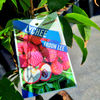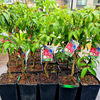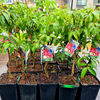In Stock
Price
$80
Order Place
157 Stonecutters Drive, Colebee, NSW-2761

kai Mai Pink Lychee Tree( air layered)
kai Mai Pink Lychee Tree( air layered)

12 July 2025 at 9:19:41 am
Uses of Lychee Fruits
Nutritional Benefits
Rich in Vitamin C
Contains antioxidants
Good source of dietary fiber
Culinary Uses
Consumed fresh as a snack
Used in desserts, such as sorbets and ice creams
Incorporated into fruit salads
Used in beverages like cocktails and smoothies
Added to savory dishes for a sweet contrast
Cosmetic Uses
Extracts used in skincare products for hydration
Used in hair care products for nourishing properties
Medicinal Uses
Traditional medicine for improving digestion
Believed to have anti-inflammatory properties
Used to boost immune system
Preservation and Storage
Can be canned or dried for long-term storage
Frozen for use in smoothies and desserts
Cultural Significance
Symbol of romance and love in some cultures
Featured in festivals and celebrations
Care and Maintenance of Lychee Plants
1. Soil Requirements
Lychee plants thrive in well-draining, sandy loam soil rich in organic matter. The ideal pH level for lychee is between 5.5 and 6.5.
2. Watering
Regular watering is essential, especially during dry spells. Ensure the soil remains moist but not waterlogged. Deep watering encourages strong root development.
3. Fertilization
Use a balanced fertilizer during the growing season. A slow-release fertilizer high in potassium is beneficial for fruit development. Apply every 6-8 weeks.
4. Pruning
Prune lychee trees to maintain their shape and remove any dead or diseased branches. This practice encourages better air circulation and sunlight penetration.
5. Pest and Disease Management
Pests: Monitor for common pests such as aphids, scale, and fruit flies. Use insecticidal soap or neem oil as needed.
Diseases: Watch for signs of fungal infections and treat with appropriate fungicides.
6. Harvesting
Lychee fruits are typically ready for harvest when they turn a bright pink to red color. Gently twist the fruit from the stem to avoid damage.
7. Environmental Conditions
Lychee plants prefer warm, humid conditions. They are sensitive to frost, so provide protection during cold weather.
8. Mulching
Apply a layer of organic mulch around the base of the tree to retain moisture, suppress weeds, and improve soil quality.
9. Seasonal Care
Spring: Fertilize and prepare for flowering.
Summer: Regular watering and pest monitoring.
Autumn: Harvest fruits and prune if necessary.
Winter: Protect from frost and reduce watering.
10. Conclusion
With proper care and maintenance, lychee plants can thrive and produce delicious fruits. Regular attention to their needs will ensure a healthy and productive tree.








